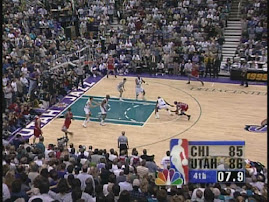Butler coach Brad Stevens recently observed:
Stevens wondered if the unclear situation might cause a reverse pendulum effect. If more players do not enter the draft because of the uncertainty, it could present an opportunity for others to leave early and benefit from a watered-down draft pool.
“Does that make this draft weaker? Might,” Stevens said. “So you might be able to get drafted higher. Does it make it so that nobody wants to go out because they don’t want to sit out their whole senior year and not play basketball until February?”
This presents a complicated situation of belief formation. The lockout news might persuade me to stay in college. But if I believe everyone else is staying in college due to the lockout, then perhaps I have extra incentive on the margin to enter the draft. But I know that everybody else is probably thinking the same way, so perhaps they all actually will enter the draft, and my original assumption about everyone staying in college is wrong. But wait!... if everyone is entering the draft after all, then perhaps I should stay in school. But if everyone else is thinking the same way, then doesn't that mean that everyone else is staying in college?
Und so weiter.
Of course, my paragraph above is a caricature: it is unrealistic to think that either every NBA-quality talent stays in college, or else every NBA-quality talent declares for the draft. A more realistic picture might also imply an equilibrium to this situation, i.e. an outcome where people are forming correct beliefs about their counterparts, and everyone is making good decisions based on those beliefs. The realism comes from considering heterogeneity among the would-be draftees. Maybe different players have different inclinations to enter the draft, based on their talent level, their college team's prospects, and their family's financial situation. Thus, the external shock of the lockout, though it touches all players, will affect different players differently: For some players, it might tip the difference from going pro to remaining a student. For other players who had previously decided that either staying in school or joining the draft was optimal for them, the lockout news might not shift their calculus. There is also heterogeneity in the players' reasoning ability; some will correctly think about how all the other potential draftees are thinking, and some will not. Some will correctly recognize such heterogeneity of thinking ability, and some will not. The secondary consideration of "How does this lockout news affect other players?" will thus have only secondary effects, and it is possible that, after a few players adjust their decisions, an equilibrium could be reached.
College and law school graduates unlucky enough to leave school in 2008, 2009, or 2010 found themselves facing the worst job market since at least the 1970s, and without a good starting position, their long-term career prospects may be commensurately curtailed. Similarly, 2011 potential draftees have it bad, as a lockout will kill their first paychecks and, if the 2011-12 season is completely cancelled, force them to compete, as unproven talent, with 2012 draftees for 2012-13 roster spots. (The 2012 draftees have a similar problem, though they will likely get a full season's worth of paychecks.) Unlike "normal" graduates, though, NBA prospects have the option to stay in school at university expense for a couple more years until the storm abates. And even a couple months of a minimum-salaried NBA paycheck could more than pay the bills for most American families. As a specialized monopoly industry, the NBA is hardly a good facsimile of the rest of the US economy.
